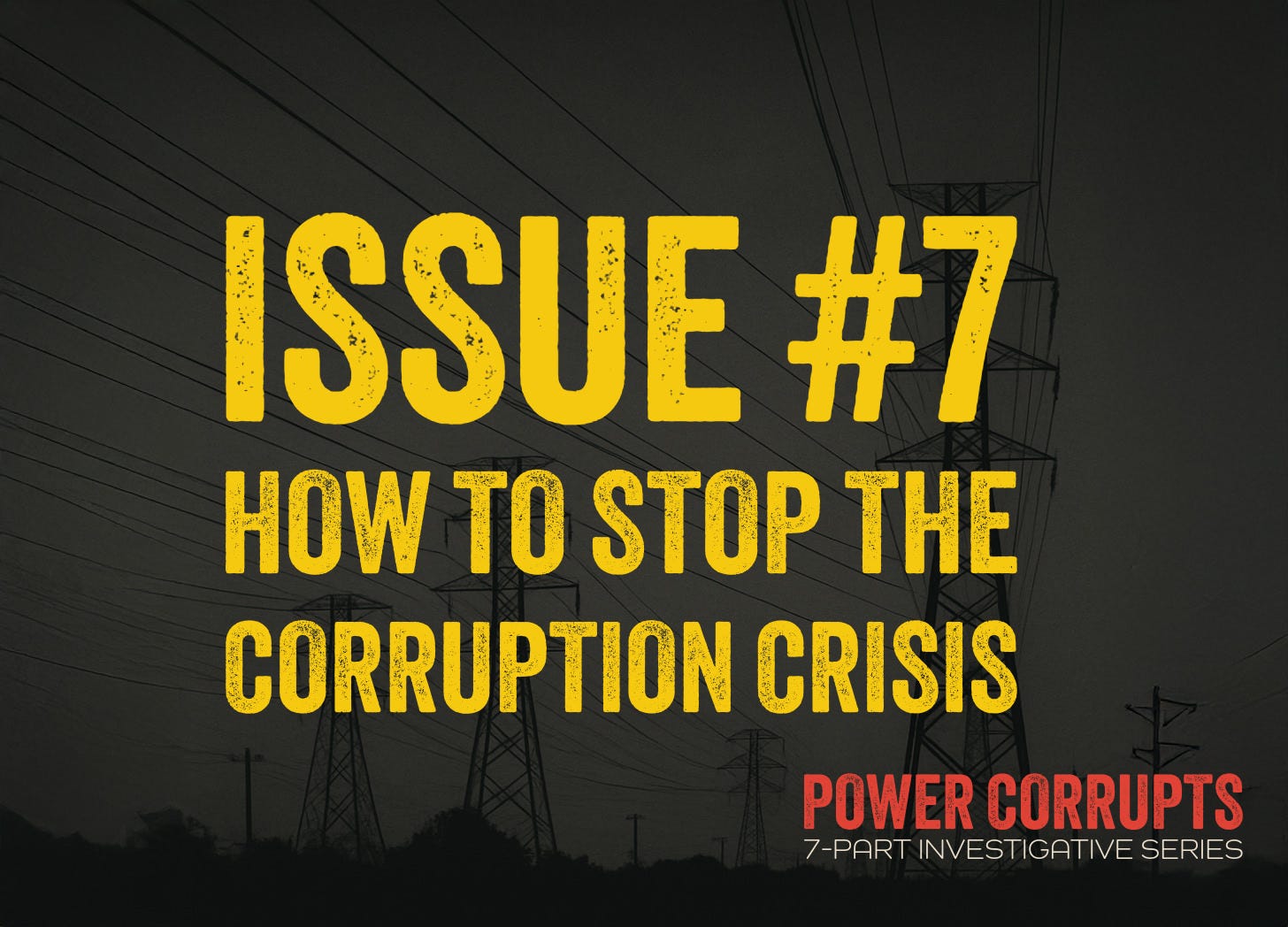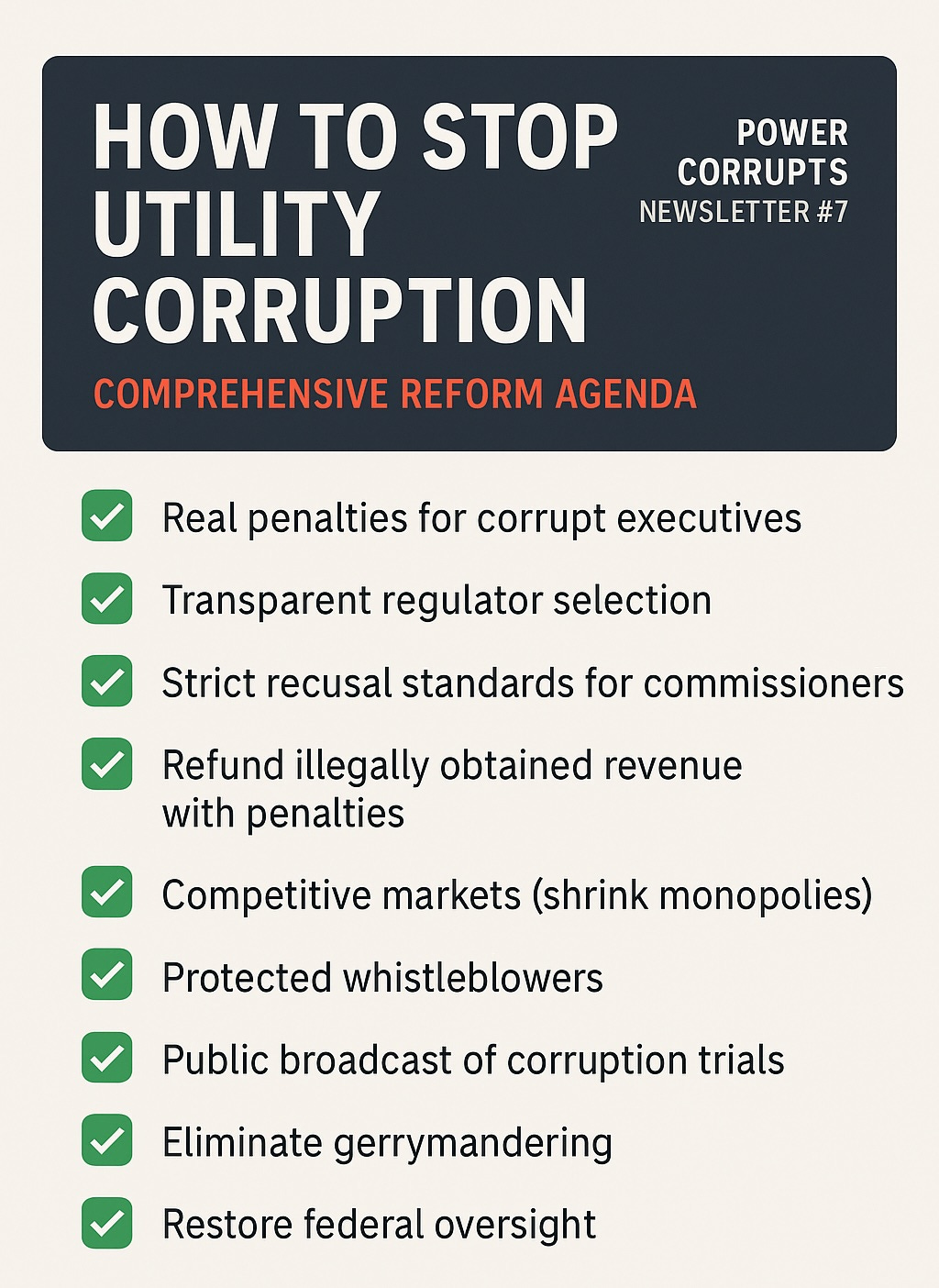"Power Corrupts" #7 (FINALE): How to Stop the Corruption Crisis
"Power Corrupts: Cleaning Up America's Biggest Industry" was published recently and is now available nationwide at bookstores and online! Get the complete investigation that reveals the full scope of utility corruption across America. If this newsletter series has opened your eyes to utility corruption, please share it with friends, colleagues, or anyone who pays an electric bill.
Introduction
Over the last month, you've witnessed billion-dollar bribery schemes, death threats over coffee, and Supreme Court decisions that made corruption nearly legal. The final question: How do we stop this crisis? Beyond dark money reforms, here are several measures to restore competitive markets, protect those who fight back, and ensure that innovation—not bribery—determines America's energy future.
Real Penalties
Impose real penalties on corrupt executives, corporations, politicians, and regulators. Since those individuals found guilty of utility crimes have tended to be shameless and to express limited, if any, remorse, their colleagues will think twice about corrupt actions only if the fraudulent face strict jail time, and not in country club prisons. Penalties for guilty corporations, moreover, need to sting.
Transparent Regulators
Provide more rigor and transparency to the selection of regulators. When governors do the picking, as happens in Ohio, make sure the nominating committee does not include former utility executives or lobbyists; also require regulated utilities to disclose all payments to that governor and recommended candidates. When hopeful commissioners face elections, as happens in Arizona, voters should have the right to know who power corporations are underwriting to be their overseers.
Strict Recusal Standards
Tighten recusal standards for utility regulators, far too many of whom have become shills for power monopolies. Noting FirstEnergy's bribe, for example, Sam Randazzo, Ohio's chief utility regulator, should have been forced, at the least, to abstain from cases impacting the giant utility. In fact, commissioners should have no associations with the regulated; being more specific, if you lobbied, worked, or consulted for a utility, you cannot be an independent commissioner.
Financial Consequences
Refund, with full interest and stiff penalties, revenue found to be illegally obtained. When power companies keep funds even after courts find their collection to have been unlawful, monopolies turn toward bribery and racketeering, knowing their questionable rate increases cannot be clawed back. Public utility commissions and the Federal Energy Regulatory Commission (FERC) should utilize their statutory authority to fine rule-breaking power companies, since monopolists will avoid corruption only when they face financial consequences for their scandalous activities.
Block Special Deals
Block kickbacks, such as those Sam Randazzo negotiated between certain industrials and utilities. Also prohibit "riders," the one-off deals for well-connected companies used to justify higher rates for residential customers. Further, require commissioners to conduct regular and comprehensive rate cases in which they fully examine and reveal a utility's finances.
Legal Reforms
Reinstate anti-corruption provisions the Supreme Court eliminated or weakened. Recognize that corruption extends beyond quid-pro-quo schemes.
Restrict gerrymandering. The rigging of district maps to guarantee partisan supermajorities curtails checks and balances, and it enables the growing corruption infecting state governments. One Ohio legislator commented, "With deeply gerrymandered districts, Republican politicians feel invincible and are more beholden to special interest groups and corporations than they are to their own constituents." HB 6 was a manifestation of this lack of accountability.
Federal Oversight
Restore provisions of the Public Utility Holding Company Act in ways that regulate monopolies controlling multi-state subsidiaries and restrict political slush funds. Increase coordination between federal and state regulators to ensure multi-state utilities don't escape oversight.
Truth in Subsidies
Frame subsidies for what they are—corruption-based tax increases. In fact, they're regressive charges that hit hardest at moderate- and low-income consumers who, too frequently, can't afford the bailout's higher costs and face electricity disconnections.
Protect Truth-Tellers
Protect whistleblowers who report corruption and misrepresentations. Insider information often is needed to identify fraud and bribery.
Broadcast corruption trials. Revelatory audio and video recordings would increase public pressure for both justice and reform.
Market-Based Solutions
Don't pick technologies. Power monopolies, despite claiming to support free markets, seek bailouts for their preferred projects, mostly coal and nuclear units. Those subsidies distort markets, making it hard for emerging innovations to compete.
Enhance competitive markets. Regulators and legislators can enable innovators by removing barriers to their development. In Ohio, for instance, Randazzo's discriminatory restrictions on the siting of wind turbines should be overturned. Power corporations, moreover, should not swallow up now-competitive businesses, such as electric vehicle charging stations. Put simply, to enhance efficiency and modernization, monopolies should shrink rather than expand.
Utility "Reforms"
Utilities caught being corrupt often deliver cleverly crafted claims of reform. After a jury found senior executives guilty of bribery, for instance, Exelon's chairman asserted the utility had "taken robust action to aggressively identify and address deficiencies, including enhancing our compliance governance and our lobbying policies to prevent this type of misconduct from ever happening again."
Power corporations also tend to suggest their racketeering results solely from a few bad apples. Again, an Exelon spokesman blamed "a small number of senior ComEd employees and outside contractors (for) orchestrating this misconduct, and they no longer work for the company."
Many utility "corrections," moreover, tend to be toothless and short-lived. In Ohio, a "now-transparent" FirstEnergy rejected a shareholder resolution calling for the disclosure of its direct and indirect lobbying expenses. At Arizona Public Service, a new CEO committed to stop political payments that advance the utility's preferred regulators, but, as public attention shifted, APS quietly reiterated its "First Amendment right" to participate secretly and extensively in elections and policy debates.
Why This Matters
Electricity monopolies have long enjoyed significant resources, largely because they receive government-guaranteed profits from consumers having little choice from where to buy their power. Since utilities recognize their fortunes are tied to decisions by legislators and regulators, they have long influenced them through extensive lobbying and controlling the flow of information, what Nobel-prize-winning economist George Stigler called "regulatory capture."
Yet a rising number of power corporations want more, especially bailouts for their own bad business decisions. They're crossing the line into corruption, with the results being reduced trust in public and private institutions, higher costs, blocked innovation, and more unnecessary pollution. Since fraud-obtained subsidies are won by the powerful overcoming the popular, it can be said that utility corruption pollutes democracy.
The Energy Transition
Scandals grow as electricity economics evolve. Since the days of Sam Insull, power companies have profited by earning returns on ever larger and more expensive generators, yet modern technologies are supplanting those "baseload" units—mainly nuclear reactors and coal-fired plants—that have trouble ramping up and down in response to fluctuating electricity demand. Remarkable technological advances—including sensors, smart meters, controls, smaller-scale generators, microgrids, and battery storage—now allow the grid to respond more nimbly than ever before. Such innovations enable entrepreneurs, and even individuals, to produce their own power and circumvent utility monopolies. While opposing such enhanced flexibility and reliability, backward-looking utilities are turning toward subsidies—often through bribery and racketeering—for their old, dirty, clunky, outmoded, and uneconomic generators.
The Future
Shelves of studies debate the likelihood, timing, and outline of an energy transition. I don't pretend to predict what technologies and companies will emerge and thrive, but I do hope to have convincingly suggested that a shift to modernization requires transparency and ethics. Said another way, since today's growing power corruption provides outmoded generators with economic lifelines, blocking fraud opens the door to energy advances.
Efficient and modern technologies thrive in fair markets, while outdated and dirty generators rely on corruption-obtained bailouts. Power monopolies increasingly bribe public officials to subsidize their uneconomic units, and they resort to racketeering to block competition. Good government and energy innovation have become linked.
Why This Matters to You
These reforms directly affect your community's energy future. When utilities face real penalties for corruption, your rates stop subsidizing their political schemes. When regulators have strict recusal standards, decisions get made based on your interests rather than utility profits. When competitive markets expand and monopolies shrink, you get access to cheaper, cleaner energy options. When whistleblowers are protected and trials are broadcast, corruption becomes harder to hide in your state. The choice is clear: continue paying inflated bills to fund utility lobbying and bailouts, or demand reforms that put energy innovation and fair markets ahead of corporate corruption. Your community's energy costs, job opportunities, and environmental health depend on these structural changes.
Thank You
This concludes our 7-part investigation into America's utility corruption crisis. Thank you for joining this journey from Samuel Insull's century-old corruption template to Chuck Jones's billion-dollar bribes to the comprehensive reforms needed to restore integrity to our energy system. The complete investigation continues in "Power Corrupts: Cleaning Up America's Biggest Industry," available wherever books are sold.





